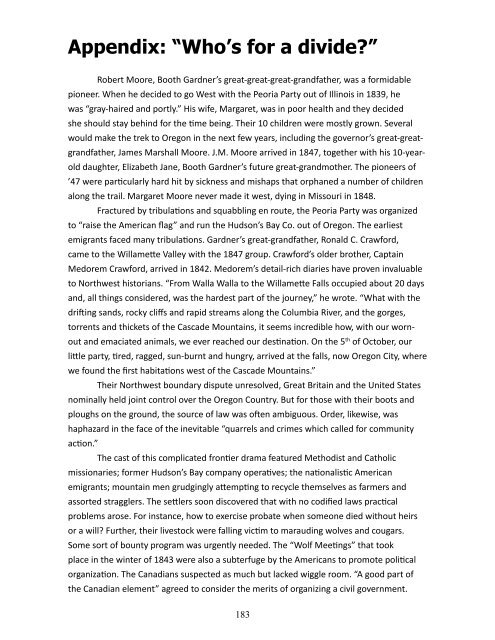booth gardner - Washington Secretary of State
booth gardner - Washington Secretary of State
booth gardner - Washington Secretary of State
You also want an ePaper? Increase the reach of your titles
YUMPU automatically turns print PDFs into web optimized ePapers that Google loves.
Appendix: “Who’s for a divide?”<br />
Robert Moore, Booth Gardner’s great-great-great-grandfather, was a formidable<br />
pioneer. When he decided to go West with the Peoria Party out <strong>of</strong> Illinois in 1839, he<br />
was “gray-haired and portly.” His wife, Margaret, was in poor health and they decided<br />
she should stay behind for the time being. Their 10 children were mostly grown. Several<br />
would make the trek to Oregon in the next few years, including the governor’s great-greatgrandfather,<br />
James Marshall Moore. J.M. Moore arrived in 1847, together with his 10-yearold<br />
daughter, Elizabeth Jane, Booth Gardner’s future great-grandmother. The pioneers <strong>of</strong><br />
’47 were particularly hard hit by sickness and mishaps that orphaned a number <strong>of</strong> children<br />
along the trail. Margaret Moore never made it west, dying in Missouri in 1848.<br />
Fractured by tribulations and squabbling en route, the Peoria Party was organized<br />
to “raise the American flag” and run the Hudson’s Bay Co. out <strong>of</strong> Oregon. The earliest<br />
emigrants faced many tribulations. Gardner’s great-grandfather, Ronald C. Crawford,<br />
came to the Willamette Valley with the 1847 group. Crawford’s older brother, Captain<br />
Medorem Crawford, arrived in 1842. Medorem’s detail-rich diaries have proven invaluable<br />
to Northwest historians. “From Walla Walla to the Willamette Falls occupied about 20 days<br />
and, all things considered, was the hardest part <strong>of</strong> the journey,” he wrote. “What with the<br />
drifting sands, rocky cliffs and rapid streams along the Columbia River, and the gorges,<br />
torrents and thickets <strong>of</strong> the Cascade Mountains, it seems incredible how, with our wornout<br />
and emaciated animals, we ever reached our destination. On the 5 th <strong>of</strong> October, our<br />
little party, tired, ragged, sun-burnt and hungry, arrived at the falls, now Oregon City, where<br />
we found the first habitations west <strong>of</strong> the Cascade Mountains.”<br />
Their Northwest boundary dispute unresolved, Great Britain and the United <strong>State</strong>s<br />
nominally held joint control over the Oregon Country. But for those with their boots and<br />
ploughs on the ground, the source <strong>of</strong> law was <strong>of</strong>ten ambiguous. Order, likewise, was<br />
haphazard in the face <strong>of</strong> the inevitable “quarrels and crimes which called for community<br />
action.”<br />
The cast <strong>of</strong> this complicated frontier drama featured Methodist and Catholic<br />
missionaries; former Hudson’s Bay company operatives; the nationalistic American<br />
emigrants; mountain men grudgingly attempting to recycle themselves as farmers and<br />
assorted stragglers. The settlers soon discovered that with no codified laws practical<br />
problems arose. For instance, how to exercise probate when someone died without heirs<br />
or a will? Further, their livestock were falling victim to marauding wolves and cougars.<br />
Some sort <strong>of</strong> bounty program was urgently needed. The “Wolf Meetings” that took<br />
place in the winter <strong>of</strong> 1843 were also a subterfuge by the Americans to promote political<br />
organization. The Canadians suspected as much but lacked wiggle room. “A good part <strong>of</strong><br />
the Canadian element” agreed to consider the merits <strong>of</strong> organizing a civil government.<br />
183

















